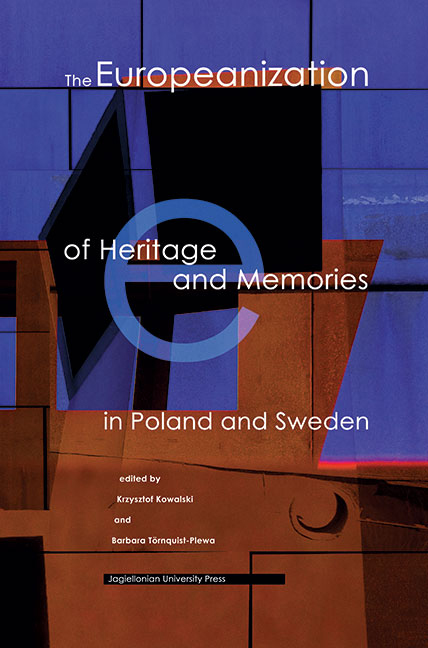Book contents
- Frontmatter
- Contents
- Acknowledgements
- Preface
- PART I European Heritage in the Making
- PART II Redefining the Dramatic Past
- The Europeanization of the Memory and Heritage of the Second World War and the Holocaust in Sweden
- The White Buses. Creating Remembrance of the Second World War in Sweden
- Remembering and Forgetting the Holocaust. The Cases of Jan Karski and Raoul Wallenberg
- The Rise of the Righteous Among the Nations as a New Model for the Polish Hero
- Europeanization at the Memorial Sites of Former Nazi Concentration Camps in Poland. The Cases of Auschwitz, Majdanek and Kulmhof
- Conclusion
- Notes on Contributors
The Europeanization of the Memory and Heritage of the Second World War and the Holocaust in Sweden
from PART II - Redefining the Dramatic Past
Published online by Cambridge University Press: 22 December 2017
- Frontmatter
- Contents
- Acknowledgements
- Preface
- PART I European Heritage in the Making
- PART II Redefining the Dramatic Past
- The Europeanization of the Memory and Heritage of the Second World War and the Holocaust in Sweden
- The White Buses. Creating Remembrance of the Second World War in Sweden
- Remembering and Forgetting the Holocaust. The Cases of Jan Karski and Raoul Wallenberg
- The Rise of the Righteous Among the Nations as a New Model for the Polish Hero
- Europeanization at the Memorial Sites of Former Nazi Concentration Camps in Poland. The Cases of Auschwitz, Majdanek and Kulmhof
- Conclusion
- Notes on Contributors
Summary
A number of researchers have pointed out the prominent place which the Second World War and the Holocaust have occupied since the 1990s in EU politics of memory. Although the Second World War was used as a narrative legitimizing the need for European integration from its very beginning (the creation of the European Coal and Steel Community in 1951), it gained in significance in the 1990s, due to the addition of the Holocaust memory to this narrative. In the light of these two historical, man-made catastrophes, the creation of the European Union (the Maastricht Treaty, 1992) appeared to be the right way to create a better, peaceful future for Europe.
The particular involvement of the EU in commemorating the Holocaust can also be explained by the usefulness of the Holocaust narrative in teaching about human rights. During the wars in the former Yugoslavia in the 1990s, Europe became anew the scene of crimes against humanity which the EU was unable to prevent. This fact, as well as the rising xenophobia and right-wing nationalism in the EU countries proper, prompted the EU political elites to assert and emphasize human rights and other values declared as European, such as democracy, tolerance and respect for minorities’ rights. Moreover, in the 1990s the EU faced the challenge of preparing for the enlargement to the East. Thus, the candidate member states had to demonstrate that they ascribed to the values which were also explicitly formulated in the Copenhagen criteria laid down in 1993.
In this context, the dedication to commemorate the Holocaust and to educate about it became part of the European Union's normative conditionality in the 1990s, a “European entry ticket” as Tony Judt expressed it. Holocaust memory could serve these political purposes also because images of this event had since the 1980s become established in European popular culture thanks to their mediation via film documentaries (e.g. Shoah) as well as American movies (e.g. Schindler's List) and TV-series (e.g. Holocaust). Thus, the broader European public could relate to it.
- Type
- Chapter
- Information
- Publisher: Jagiellonian University PressPrint publication year: 2016



